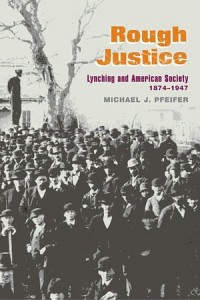I’ve spent my life accepting God’s plan. Whenever I think of the deaths of my brother and best friend, I chalk it up to God’s plan. Surely, I tell myself, their deaths were part of some greater good mere mortals could never understand.
Accept it, yeah. But I’ve never liked losing those two. There’s a lot in life that may be part of God’s plan. I truly believe that I have to accept it and work the experiences into being a better human being. But like it? Not today. Probably not ever.
Mood music:
[spotify:track:2yWOMbhPN2XJAiVy46Bhvz]
Those are very personal examples, but something in the American political discourse has me thinking about it. Friday, I showed you a quote from Jon Hubbard, a Republican state representative from Arkansas. I called him an asshole for suggesting that slavery may have been a blessing in disguise for African Americans, because through that awful American tragedy they get to live in the “greatest nation ever established on the face of the Earth.”
A reader and friend commented, asking why I felt the need to stoop low and call Hubbard an asshole. She then quoted Scripture. I’ve always loved that about her, because she’s one of those rare people who can discuss faith and actually have the biblical knowledge to back it up. She also said:
I read his statement as comparing the ultimate fate of those once enslaved in the US to those who were not and now live in famine, poverty and a daily threat of torture or death.
When comparing where one is today because of past events and where one could be if they had not occurred, perhaps the right statement is “there but for the grace of God go I”. That isn’t to excuse slavery, or it’s horrifying existence, but to look back on it (as we often do when we are past some horrible experience) and consider it in terms of God’s plans and how He might have worked it to our benefit.
But that’s probably asking too much from people who think with their emotions and overreact to every little statement they read from the “opposite” side.
I don’t disagree with any of that, and I get that Hubbard was suggesting something similar. What angered me about Hubbard’s statement was that his language almost makes it sound like African Americans got a hell of a deal. They were enslaved, living in famine, poverty and a daily threat of torture or death. But now their great-great-great-great grandkids get to live “in the greatest country on Earth.” In hindsight, calling him an asshole wasn’t my finest hour, and I apologize for that. I don’t apologize for disagreeing with a guy who justified evil as a blessing in disguise.
The deaths of my brother and friend were part of God’s plan. We had no control over them; we didn’t cause them and we couldn’t prevent them. Could Michael or Sean have prevented their deaths? Hard to say.
But slavery is humanity’s evil. Mankind could have prevented it or ended it sooner. Mankind had control. Just because God made something good come out of it doesn’t mean slavery was a blessing. If blacks had been free from the first, they would have had better lives in the colonies and their descendants would have better lives now.
It’s particularly problematic to say slavery was a blessing because even after slavery was abolished, blacks were still marginalized and treated brutally. They were excluded from many of the blessings of American life for more than a century after slavery ended. Many died in lynchings and their homes were burned to the ground.
Are African Americans in a better place today? Surely. That doesn’t mean I have to agree that their past subjugation was a cloud with a silver lining; that they were getting what was good for them and they just didn’t know it at the time.
Just as I don’t have to like the things that happened in my personal history, whether it was part of God’s bigger design or not.
There’s a huge difference between accepting something and liking it.

